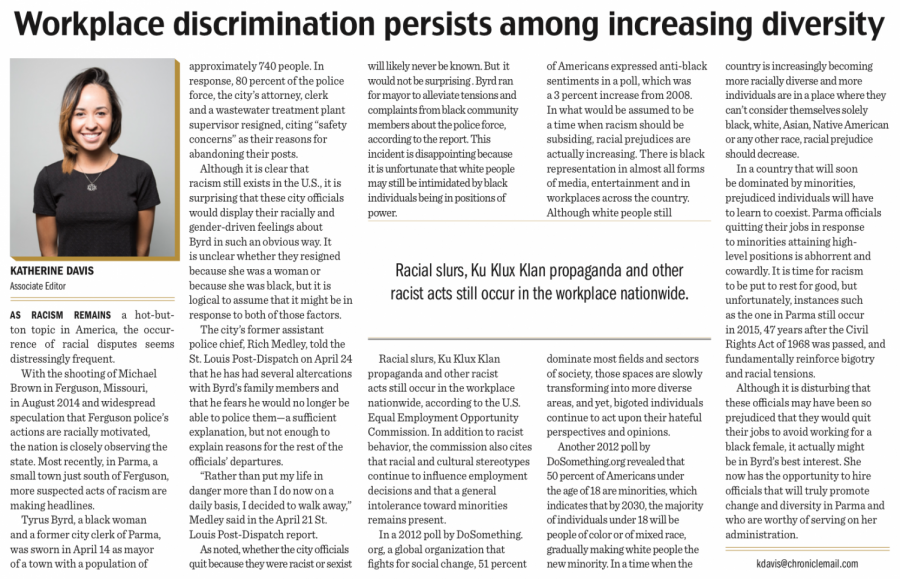Workplace discrimination persists among increasing diversity
April 27, 2015
As racism remains a hot-button topic in America, the occurrence of racial disputes seems distressingly frequent.
With the shooting of Michael Brown in Ferguson, Missouri, in August 2014 and widespread speculation that Ferguson police’s actions are racially motivated, the nation is closely observing the state. Most recently, in Parma, a small town just south of Ferguson, more suspected acts of racism are making headlines.
Tyrus Byrd, a black woman and a former city clerk of Parma, was sworn in April 14 as mayor of a town with a population of approximately 740 people. In response, 80 percent of the police force, the city’s attorney, clerk and a wastewater treatment plant supervisor resigned, citing “safety concerns” as their reasons for abandoning their posts.
Although it is clear that racism still exists in the U.S., it is surprising that these city officials would display their racially and gender-driven feelings about Byrd in such an obvious way. It is unclear whether they resigned because she was a woman or because she was black, but it is logical to assume that it might be in response to both of those factors.
The city’s former assistant police chief, Rich Medley, told the St. Louis Post-Dispatch on April 24 that he has had several altercations with Byrd’s family members and that he fears he would no longer be able to police them—a sufficient explanation, but not enough to explain reasons for the rest of the officials’ departures.
“Rather than put my life in danger more than I do now on a daily basis, I decided to walk away,” Medley said in the April 21 St. Louis Post-Dispatch report.
As noted, whether the city officials quit because they were racist or sexist will likely never be known. But it would not be surprising . Byrd ran for mayor to alleviate tensions and complaints from black community members about the police force, according to the report. This incident is disappointing because it is unfortunate that white people may still be intimidated by black individuals being in positions of power.
Racial slurs, Ku Klux Klan propaganda and other racist acts still occur in the workplace nationwide, according to the U.S. Equal Employment Opportunity Commission. In addition to racist behavior, the commission also cites that racial and cultural stereotypes continue to influence employment decisions and that a general intolerance toward minorities remains present.
In a 2012 poll by DoSomething.org, a global organization that fights for social change, 51 percent of Americans expressed anti-black sentiments in a poll, which was a 3 percent increase from 2008. In what would be assumed to be a time when racism should be subsiding, racial prejudices are actually increasing. There is black representation in almost all forms of media, entertainment and in workplaces across the country. Although white people still dominate most fields and sectors of society, those spaces are slowly transforming into more diverse areas, and yet, bigoted individuals continue to act upon their hateful perspectives and opinions.
Another 2012 poll by DoSomething.org revealed that 50 percent of Americans under the age of 18 are minorities, which indicates that by 2030, the majority of individuals under 18 will be people of color or of mixed race, gradually making white people the new minority. In a time when the country is increasingly becoming more racially diverse and more individuals are in a place where they can’t consider themselves solely black, white, Asian, Native American or any other race, racial prejudice should decrease.
In a country that will soon be dominated by minorities, prejudiced individuals will have to learn to coexist. Parma officials quitting their jobs in response to minorities attaining high-level positions is abhorrent and cowardly. It is time for racism to be put to rest for good, but unfortunately, instances such as the one in Parma still occur in 2015, 47 years after the Civil Rights Act of 1968 was passed, and fundamentally reinforce bigotry and racial tensions.
Although it is disturbing that these officials may have been so prejudiced that they would quit their jobs to avoid working for a black female, it actually might be in Byrd’s best interest. She now has the opportunity to hire officials that will truly promote change and diversity in Parma and who are worthy of serving on her administration.








